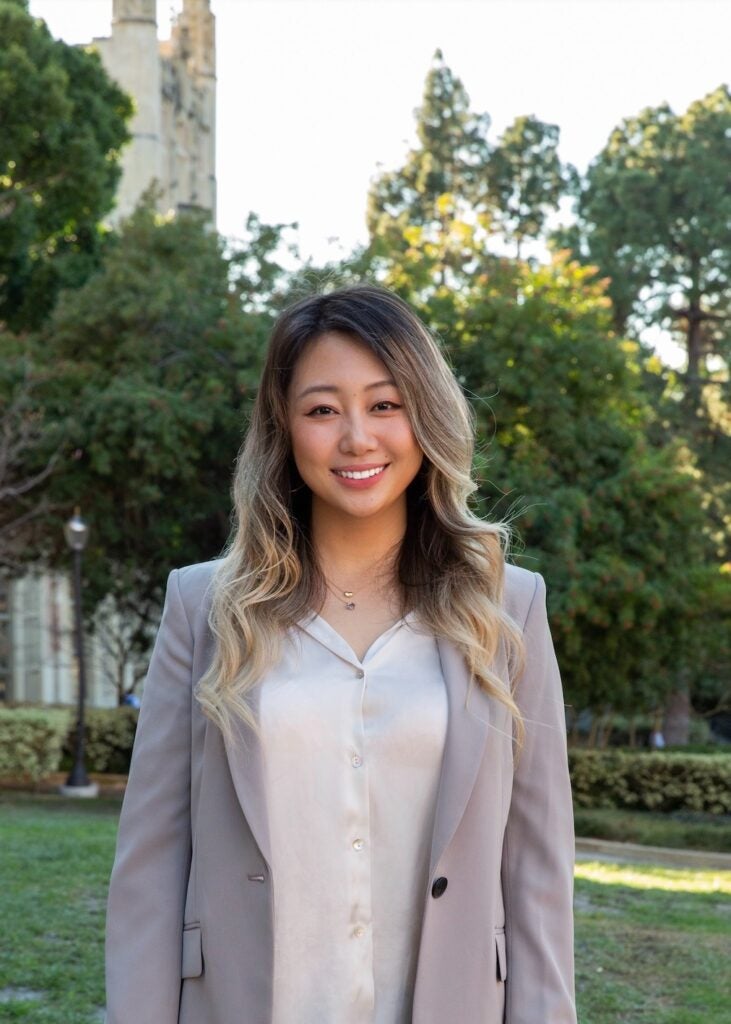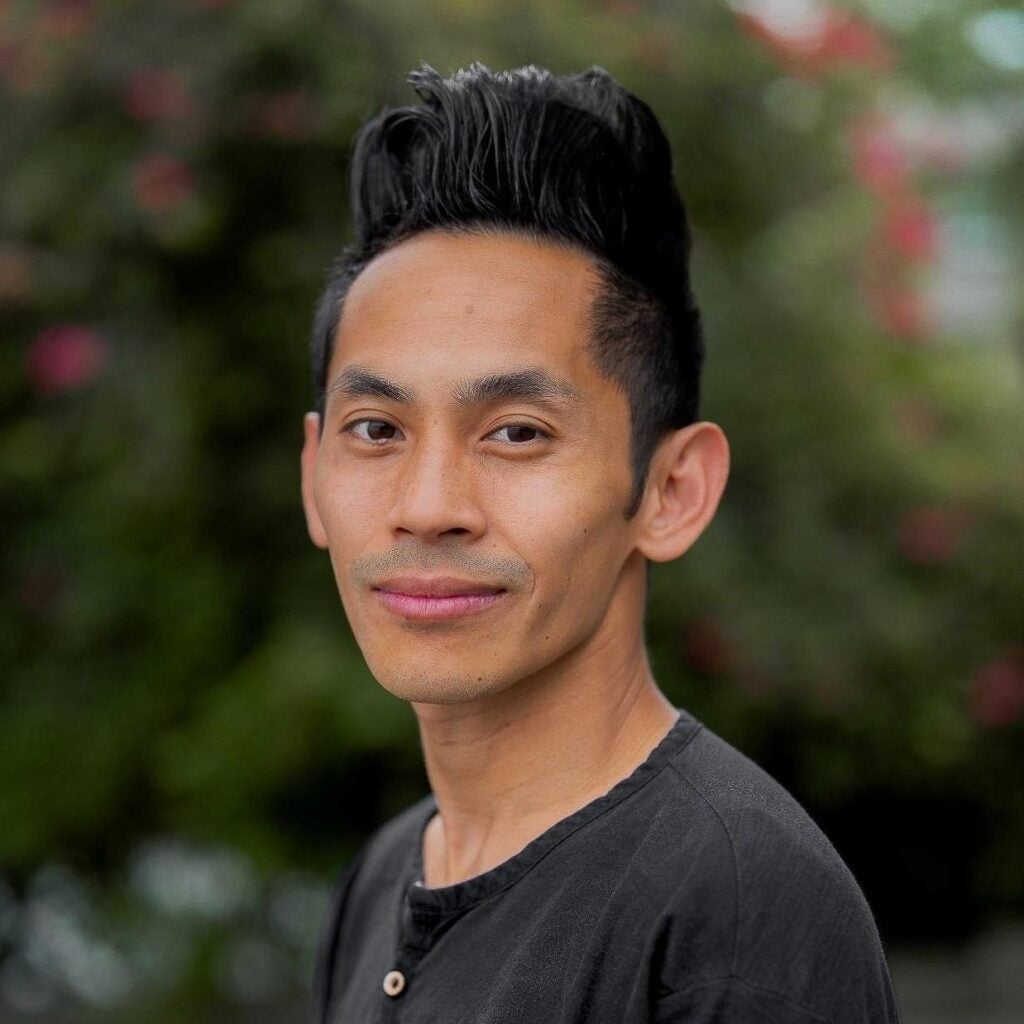Siyue “Lena” Wang and Davis Vo, PhD candidates at the UCLA School of Education and Information Studies, have been selected as 2025 National Academy of Education/Spencer Dissertation Fellows.
Selected from a competitive pool of more than 400 applicants, Wang and Vo are among just 35 students nationwide to receive the prestigious award. The Fellowship provides funding and professional development to early-career scholars whose projects address critical issues in the history, theory, or practice of formal or informal education at the national and international levels.
Wang’s dissertation, “Becoming the “Mystical Unicorn”: Understanding the Racialized Illegality Experiences of Undocumented Asian College Students in California,” brings visibility to the often-overlooked experiences of undocumented Asian students in U.S. higher education—particularly how they make sense of, navigate, and persist through college campuses.
In California, one in five undocumented immigrants identifies as Asian or Pacific Islander (API), yet their stories are rarely included in conversations about immigration justice or educational equity. Wang’s research centers these voices and examines how race and legal status intersect to shape undocumented Asian students’ access, belonging, and resistance. Her work underscores how the racialization of illegality operates not just at the policy level, but within higher education institutions, where schools act as both catalysts and gatekeepers, often deepening the invisibility of undocumented students.
“As an immigrant whose own education has at times been disrupted by the immigration and schooling systems, this research is deeply personal to me,” says Wang. “Even within undocumented or API communities, we rarely talk about undocumented Asian and Pacific Islander students. We are the minority within the minority—often overlooked, often misunderstood.

“There is so much invisibility and lack of understanding about the undocumented API community in general,” she explains. “We don’t really talk about the API community and immigration. The community is rarely included in national conversations around immigrant rights or educational equity. But we cannot fully understand what it means to be undocumented—nor how immigration is racialized and criminalized—without understanding the experiences of undocumented Asian and Pacific Islander students.”
Wang’s study examines the experiences of undocumented Asian students in California. Drawing on multi-site critical ethnography and 111 in-depth interviews with 77 undocumented Asian students, her research illustrates how higher education institutions perpetuate invisibility while also serving as critical spaces for resistance and belonging. The research shows that undocumented Asian students make strategic decisions about disclosing information and engage in collective advocacy and community-building to challenge exclusionary structures and redefine citizenship through everyday resistance. The study challenges deficit-based narratives and highlights strategies for cultivating joy, solidarity, and resistance, and calls for transformative policies to address intersectional barriers faced by diverse undocumented and underserved populations to advance equity in higher education.
“I want people to know that undocumented Asian students exist,” she adds. “They come in different skin colors, from different countries and languages, with different dreams and challenges. We need to engage these students, support them, and empower them—not only to survive, but to thrive, to feel connected, to feel seen.
“There are so many assumptions about who is undocumented, and oftentimes it is racialized,” Wang continues. “Undocumented students who carry deep vulnerabilities, yet their struggles often go unseen, and they may not be recognized as needing additional support. We need to empower them to feel a sense of belonging, to feel inspired to continue their education and shape their futures.
“Undocumented Asian students are an integral piece in understanding the full story of race and immigration in this country,” Wang reflects. “Undocumented API experiences help debunk the machinery of racialized immigration illegality and expose the limits of who we imagine when we talk about ‘the undocumented.’ These students carry layers of vulnerability, often hidden, and yet they persist. They remind us that joy and healing can take root even in the harshest conditions—and that resistance can look like blooming.”
Davis Vo is a doctoral candidate and education researcher in the School of Education and Information Studies at UCLA. His research explores the conditions that foster improved higher education access, equity, and success, particularly for historically minoritized communities. With a focus on community colleges, his work examines the experiences and outcomes of community college students and the impact of the educational practices, policies, and conditions of community colleges in opening the doors to opportunity and furthering academic and career success.

“Community colleges deserve more attention in how we define and study higher education. My research invites us to think more expansively–and more equitably–about who these programs serve, how they work, and why they matter,” says Vo. “We need further language, understandings, framings, and research to truly capture the potential of community college bachelor’s degrees.“
Vo’s dissertation, “Revising Roles, Transforming Trajectories: Evaluating Community College Baccalaureate Programs’ Implications on Educational Access and Equity,” explores the implications of community colleges’ adoption of bachelor’s degree programs on educational access, success, and equity.
His work also examines whether CCB graduates earn significantly higher (or different) wages compared to their academically and demographically similar counterparts. In a separate analysis, he is also exploring meaningful educational access through an examination of factors and challenges common to community colleges in general and CCB programs specifically, such as administrative burdens, economic factors, fields of study, geographic influences, social forces, and time-related considerations. Vo plans to conduct semi-structured one-on-one interviews with prospective and current community college students and those who have completed or paused enrollment from at least four community colleges in California, home of the largest community college system in the United States.
Through his dissertation, Vo aims to generate insights into the ways that CCB programs contribute to the alleviation or reproduction of economic/social stratification, mobility, and equality.
“I hope that this research will inform more effective, efficient, and equitable policies and practices so that more students can meaningfully access the life-changing benefits of a bachelor’s degree, says Vo.
”As community college bachelor’s degree programs continue to expand nationally, I am hopeful that more expansive language, research, and empirical insights into how these programs contribute to longstanding issues of access and equity, improve educational practices and policies and expand opportunities.
“I’m proud to join with and build on the work of so many scholars, educators, and students who believe in the promise of community colleges, and greatly appreciate the support of the National Academy of Education and the Spencer Foundation in helping to share this research and amplify those voices,” Vo concludes.
